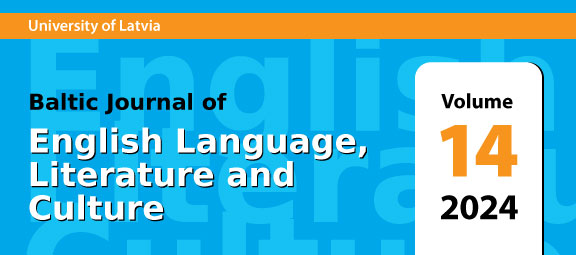The Dynamics of Transcultural Insight in Jhumpa Lahiri’s Literary Universe
DOI:
https://doi.org/10.22364/BJELLC.14.2024.07Keywords:
belonging, Hinduism, incompleteness, minimalism, transcendent, transculturalAbstract
Blending literary and cultural studies, the essay discusses the manners in which Jhumpa Lahiri’s literary universe constructs a gradual unfolding of a layered transcultural vision.
The paper argues that in the shift from fictions of migration to autobiographical narratives of self-redefinition, the Bengali-American author advances cultural scenarios of transformation that enable the reshaping of cultural identities through the transcendence of fixed cultural loyalties. Invoking perceived lacks in their native cultural traditions and intuiting the incompleteness of cultures, her characters are haunted by the urge to cross cultural boundaries in order to gain a sense of personal fulfilment. Ultimately, Lahiri herself replicates this pattern as she relocates to Italy and writes in a new language (Italian).
The last stage in Lahiri’s transcultural scenario is represented by an attempt to dissociate cultural specificity from the notion of identity, as she takes refuge in the realm of abstraction through minimalist aesthetics. Relying on a close reading of her texts, the essay will scrutinise the author’s peculiar outlook on transculturality, which appears to embrace various cultural spaces while seemingly avoiding specific attachments. The analysis aims to establish whether Lahiri succeeds in transgressing the very idea of cultural belonging in her quest for a freeing path.
References
Appiah, A. K. (2007) Cosmopolitanism: ethics in a world of strangers. London and New York: W. W. Norton & Company.
Berg, W. (2011) Transculturality. In B. Wolfgang (ed.) Transcultural Areas, Crossculture (pp. 7-15). Wiesbaden: VS Research.
Botha, M. (2017) A Theory of Minimalism. London a.o.: Bloomsbury Academic.
Brosius, C. and Wenzlhuemer, R. (2011) Introduction: transcultural turbulences: towards a multi-sited reading of image lows. In C. Brosius, and R. Wenzlhuemer (eds.) Transcultural Turbulences: towards a multi-sited reading of image flows, Transcultural research: Heidelberg studies on Asia and Europe in a global context (pp. 3-24). Heidelberg and New York: Springer.
Dagnino, A. (2013) Global mobility, transcultural literature, and multiple modes of modernity. The Journal of Transcultural Studies, 4(2): 130-160.
Epstein, M. (1999) From culturology to transculture. In E. E. Berry and M. Epstein (eds.) Transcultural Experiments Russian and American Models of Creative Communication (pp. 15-30). London: Palgrave Macmillan.
Epstein, M. (1995) After the Future: the paradoxes of postmodernism and contemporary Russian culture. Amherst, MA: The University of Massachusetts Press.
Gilsenan Nordin, I., Hansen J. and Llena, C. Z. (2013) Introduction: conceptualizing transculturality in literature. In I. Gilsenan Nordin, J. Hansen and C. Z. Llena (eds.) Transcultural Identities in Contemporary Literature, Cross/Cultures: readings in the post/colonial literatures in English, vol. 167 (pp. ix-xxvii). Amsterdam and New York: Rodopi.
Hannerz, U. (2001) Transnational Connections: culture, people, places. London and New York: Routledge.
Hawthorne, N. (2006). The Scarlet Letter: Webster’s Thesaurus Edition. San Diego, CA: Icon Group International, Inc.
Houamdi, D. (2019) The changing face of minimalism in American literature. Aleph, 6(2): 55-73.
Krasniqi, M. (2018) Minimalism in literature: Musine Kokalari. European Journal of Language and Literature Studies, 4(3): 55-60.
Lahiri, J. (2013) The Lowland. New York and Toronto: Alfred A. Knopf.
Lahiri, J. (2008) Unaccustomed Earth. New York and Toronto: Alfred A. Knopf.
Lahiri, J. (2004) The Namesake. London: Harper Perennial.
Lahiri, J. (1999) Interpreter of Maladies. New York, NY: Houghton Mifflin Company.
Motte, W. Jr. (1999) Small Worlds Minimalism in Contemporary French Literature. Lincoln and London: University of Nebraska Press.
Neumann, V. (2003) Neam, popor sau naţiune?: despre identităţile politice europene [Kinfolk, People or Nation?: On European Political Identities]. Bucureşti: Curtea Veche.
Pieterse, J. N. (2009) Globalisation and Culture: global mélange. Plymouth: Rowman and Littlefield Publishers, Inc.
Rambachan, A. (2006) The Advaita Worldview: God, world, and humanity, SUNY series in religious studies. New York, NY: State University of New York Press.
Sartre, J.-P. (1965) What is Literature?. New York, NY: Harper and Row.
Schultermandl, S. and Toplu, S. (2010) A fluid sense of the self: the politics of transnational identity in Anglophone literatures. In S. Schultermandl and S. Toplu (eds.) A Fluid Sense of the Self: the politics of transnational identity (pp. 11-24). Berlin: LIT Verlag.
Sharma, C. (2007) Advaita Tradition in Indian Philosophy: a study of Advaita in Buddhism, Vedanta and Kashmira Shaivism. Delhi: Motilal Banarsidass.
Strickland, E. (2000) Minimalism: origins. Bloomington, IN: Indiana University Press.
Vertovec, S. (2009) Transnationalism Key Ideas. London and New York: Routledge.
TEXTS ANALYSED
Lahiri, J. (2021) Whereabouts. New York and Toronto: Alfred A. Knopf.
Lahiri, J. (2016) In Other Words. London a.o.: Bloomsbury.
Downloads
Published
Issue
Section
License
Copyright (c) 2024 University of Latvia

This work is licensed under a Creative Commons Attribution-NonCommercial 4.0 International License.


